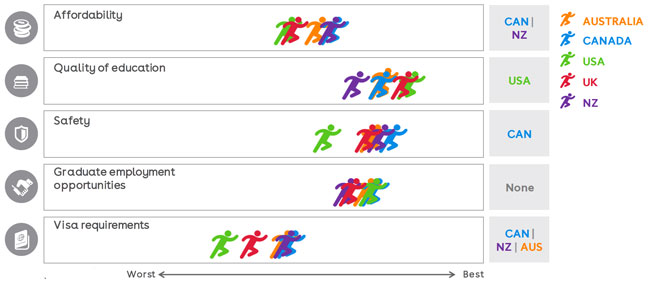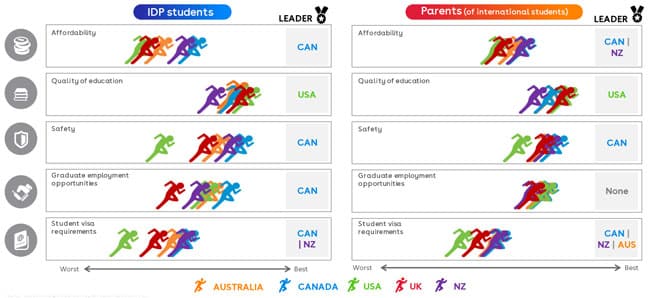Comparing parent and student perceptions of leading study destinations
New research presented at the 2019 Australian International Education Conference in Perth underlines:
- The significant influence that parents have on international students’ decisions about study abroad.
- That parents have different focuses and concerns than students when it comes to researching where to study.
- That it would be a mistake to not include a targeted marketing strategy aimed at parents in the overall international outreach plan, with promotions and messaging tailored just to them.
IDP Connect’s Student Buyer Behaviour Study is an annual survey, and this year there was also an inaugural Parents of International Students Study conducted in partnership with the Australian Trade and Investment Commission (Austrade). In all, the studies examined more than 2,300 students’ and 720 parents’ perceptions of the attractiveness of five major study destinations – Australia, Canada, New Zealand, the US, and the UK – as well as motivations and factors in their study abroad decision making.
Students were surveyed mostly in Asia (Bangladesh, China, Hong Kong, India, Indonesia, Malaysia, Philippines, Singapore, Taiwan, Thailand, and Vietnam). Some Middle Eastern students were also included in the sample, and Indian students were slightly overrepresented (i.e., there was a skew in the sample with more Indians than other nationalities). Most students were either recent arrivals at their host institution or had applied to an institution abroad.
Parents were surveyed mostly in Middle and South America and Asia, with some Middle Eastern parents as well: Brazil, Colombia, and Mexico; China, India, Indonesia, Nepal, and Vietnam; and UAE. Indian students were slightly overrepresented. Over half of parents intended to send their child abroad in the next two years, with the remainder having children who had applied to or who had already arrived at their host institution.
Key findings
- Parents and students both contribute to the ultimate decision about where students will go for their education and what programmes they will take;
- Parents have more influence in where a student goes abroad (80% of students said their parents were the primary decision maker on this front) and the perceived safety of a destination is a major factor for parents;
- Students have more influence in what they will study (73% of students said they were the main decision maker in this area) and priorities for them are post-study work opportunities and affordability;
- Parents and students often attend student fairs and meet with agents together but conduct online research about study abroad separately.
Simon Emmett, CEO of IDP Connect, said,
“[These] findings demonstrate the need for education providers to develop tailored information for both groups to ensure marketing materials do not neglect parents, who are an important influencer in the decision-making process.”
Students’ and parents’ perceptions
Given a list of five attributes, students chose Canada first for all except for quality of education; the US came first for this last factor. Parents were more mixed in their opinions. Most importantly – because they prioritise safety for their children in decision making – they ranked Canada first for safety, followed by New Zealand and Australia.

The following chart illustrates the striking differences between parents and students regarding safety (much more of a concern for parents) and tuition fees and job prospects after graduation (much more of a concern for students). Living costs were a major concern for both students and parents.

Other research also makes the case
Another recent survey conducted by research firm EAB among 5,580 college-bound students found that 76% indicated that their parents were highly influential and more influential than friends. Another EAB study of 1,500 parents found that 74% felt that colleges should communicate with them directly.
Regarding that research, Higher Education Marketing noted that parental involvement is notably intense in Asia:
“[Parents are particularly likely to assume the leading role in decision-making in] Asian countries that comprise the majority of international student recruitment, especially traditional Confucian cultures like China that value respect and obedience to family authority.”
Parents hold the purse strings
If international students are not on scholarships or do not receive significant financial aid, there is a very high likelihood that they are being funded by their parents. Even when there is a scholarship, parents are likely to cover additional costs not covered by the government and/or institutional financial assistance. For this reason – as well as many others including overall student satisfaction and retention – communicating with parents at both the outset of their interest in an university, college, or school and during the course of students’ time at the institution is a crucial element of successful internationalised campuses today.
For additional background, please see:











